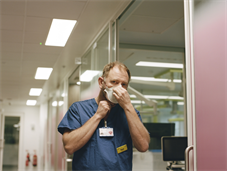Surviving Covid
02 December 2020 - Channel Four documentary follows King's patients affected by the virus

Dr Tom Best, clinical director of critical care at King’s, talks about inviting a documentary crew to film during the COVID-19 pandemic, how the Trust has been caring for patients with the virus, and the challenges of living with Long Covid.
Q: Can you tell us a bit about your role during the pandemic?
A:I had to plan for something that had previously been unimaginable. Everyone was learning about COVID-19 and how best to treat it. My role involved daily reports to national and regional bodies, including Public Health England and NHS England, managing the extraordinary shifts in activity, decision making, communication, through to clinical work directly with patients. As more and more people with COVID-19 began needing our care, we focused our efforts on stretching our resources and maximising support in imaginative ways from outside critical care.
Q: You and your team feature in the new Channel 4 documentary about COVID-19, which looks at some of the long term effects. What is Long COVID exactly?
A: Long Covid refers to an extended post viral syndrome specific to COVID-19 itself. This can occur whether or not you have been admitted to intensive care and may even occur if you have had mild symptoms.
The film follows patients that have had long intensive care unit (ICU) admissions. These patients will have lasting effects as a result of their ICU stay (post ICU syndrome), irrespective of whether or not they also have long Corvid.
Post ICU syndrome and Long Covid have often been conflated recently as patients can suffer from similar symptoms, such as exhaustion.
Q: What are the challenges faced by patients who spend many months in critical care?
A: Generally, the longer the stay the longer the recovery. Patients typically experience mental and physical problems, which can include memory loss, prolonged anxiety, depression, weight loss, chronic pain or nerve damage.
The good news is that with time, and the right care, most of these problems are reversible. And every day we are learning more and more how to minimise and prevent these problems if we apply the highest quality care.
Q: What was your experience of featuring in the documentary and having cameras around?
A: I had seen an extraordinary film that Nick, the director had made, in another ICU several years ago. That gave me a lot of confidence – given the last thing, at the time, that I wanted to worry about was a film crew. And in fact the crew were extremely sensitive, professional and knowledgeable. I think we all had a mutual trust, and they became part of the furniture. This was to their credit.
Q: What do you hope viewers will take away from watching the documentary?
A: Hopefully, a little bit more about COVID-19 from a patient’s and loved one’s perspective. What it’s really like to be in intensive care, and how important it is to have family and loved ones at your bedside – they can help save your life. And how that is challenged by this illness.
Also I think this film somehow seems to effortlessly capture the spirit and culture of King’s intensive care, which I think is a truly special place.
